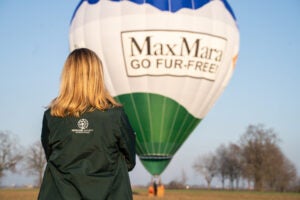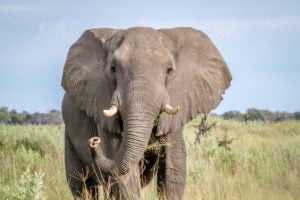
MILAN—After receiving hundreds of thousands of emails from compassionate consumers around the world, thousands of phone calls, countless social media posts and even having a hot air balloon flown over its headquarters in Italy asking it to go fur-free, Max Mara Fashion Group has officially announced a fur-free policy.
In an internal memo to staff, Max Mara said, “The Company does not sell, online nor in any of its physical retail locations, any products made with fur, nor is there the intention to introduce any products made with fur into any upcoming collections of Max Mara Fashion Group brands.”
This was confirmed by a Max Mara executive, who added, “Max Mara, including the MMFG and any subsidiaries, has adopted a fur-free policy and has no intention of introducing fur into any upcoming collection for any of the MMFG brands.”
This announcement comes after the Fur Free Alliance, a coalition of more than 50 animal protection organizations―including Humane Society International― from over 35 countries, launched a global campaign during fashion weeks in February 2024 in New York City, London, Milan and Paris urging the Italian fashion giant to adopt a fur-free policy. The campaign saw more than 270,000 emails, 5,000 phone calls and countless social media posts delivering a clear message asking Max Mara to go fur-free.
Max Mara Fashion Group has 2,500+ stores in 105 countries and was previously selling items such as mink gloves, fox fur cuffs and a raccoon dog key chain. The brand now joins the world’s major fashion-houses that have already gone fur-free, including Dolce & Gabbana, Saint Laurent, Valentino, Prada, Gucci, Versace, Alexander McQueen, Balenciaga and Armani.
In February this year, Humane Society International/Europe and LAV flew a hot-air balloon over Max Mara’s headquarters in the city of Reggio Emilia during Milan Fashion Week, displaying a fur-free message.
P.J Smith, director of fashion policy at Humane Society International and the Humane Society of the United States, said: “Congratulations to Max Mara for joining so many other fashion brands and retailers that have already taken a stand against the cruel fur trade. Activists around the world came together to ask Max Mara to do the right thing, and they listened, making it clear fur has no place in fashion. Let’s celebrate this win for animals and a fur-free future!”
Joh Vinding, chairman of the Fur Free Alliance, said: “The Fur Free Alliance applauds Max Mara for going fur-free. Max Mara was one of the last global fashion brands that still sold fur, so we’re glad they have now joined a growing list of fur-free brands that want nothing to do with animal cruelty associated with the fur trade.”
Today, over 1,500 brands and retailers have pledged to go fur-free by joining the Fur Free Retailer Program.
Fur facts:
- Tens of millions of animals suffer and die each year in the global fur trade. The majority of the animals killed for fur are reared in barren battery cages on fur farms.
- Fur farming has been banned in 21 European countries – the 15 Member States of Austria, Belgium, Croatia, Czech Republic, Estonia, France, Ireland, Italy, Latvia, Lithuania, Luxembourg, Malta, Netherlands, Slovakia, Slovenia plus Bosnia and Herzegovina, Guernsey, Norway, United Kingdom, North Macedonia and Serbia. In addition, two countries (Switzerland and Germany) have implemented strict regulations which have effectively brought fur farming to an end and three countries (Denmark, Sweden, Hungary) have imposed measures that have ended the farming of certain species. Mink farming has also been banned in the Canadian province of British Colombia. Political discussion of a ban is underway in Bulgaria, Romania and Sweden.
- Israel became the first country to ban fur sales, in 2021. In the United States, fur sales are banned in the state of California as well as ins 16 towns or cities. Political discussion on a fur import ban is underway in Switzerland
- Mink on almost 488 fur farms across 13 countries in Europe and North America have been found to be infected with COVID-19. Millions of farmed mink, in countries such as Denmark and the Netherlands, were ordered to be killed on public health grounds. Highly Pathogenic Avian Influenza A(H5N1) has been found on 72 fur farms (one in Spain, 71 in Finland) to date. Around 500,000 animals, including mink, arctic fox, red fox, raccoon dogs and sable, have been ordered to be killed on public health grounds.
Download visuals of the Max Mara hot-air balloon stunt.
Media contact: Yavor Gechev, EU communications director: ygechev@hsi.org








